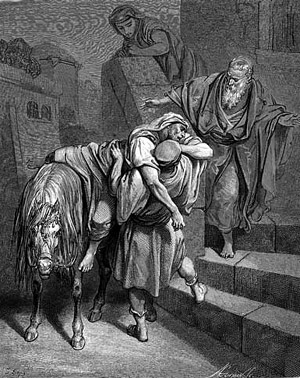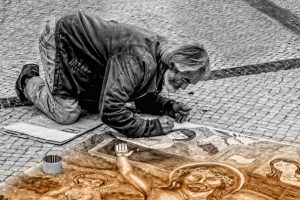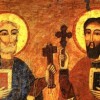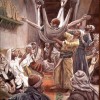Sermon on the 24th Sunday after Pentecost
Luke 10:25-37
And behold, a certain lawyer stood up and tested Him, saying, “Teacher, what shall I do to inherit eternal life?” He said to him, “What is written in the law? What is your reading of it?” So he answered and said, “‘You shall love the LORD your God with all your heart, with all your soul, with all your strength, and with all your mind,’ and ‘your neighbor as yourself.’ ” And He said to him, “You have answered rightly; do this and you will live.” But he, wanting to justify himself, said to Jesus, “And who is my neighbor?” Then Jesus answered and said: “A certain man went down from Jerusalem to Jericho, and fell among thieves, who stripped him of his clothing, wounded him, and departed, leaving him half dead. Now by chance a certain priest came down that road. And when he saw him, he passed by on the other side. Likewise a Levite, when he arrived at the place, came and looked, and passed by on the other side. But a certain Samaritan, as he journeyed, came where he was. And when he saw him, he had compassion. So he went to him and bandaged his wounds, pouring on oil and wine; and he set him on his own animal, brought him to an inn, and took care of him. On the next day, when he departed, he took out two denarii, gave them to the innkeeper, and said to him, ‘Take care of him; and whatever more you spend, when I come again, I will repay you.’ So which of these three do you think was neighbor to him who fell among the thieves? And he said, “He who showed mercy on him.” Then Jesus said to him, “Go and do likewise.”
 We’re all familiar with the Parable of the Good Samaritan, read today from the Gospel according to St. Luke. A “certain lawyer,” we are told, approached the Lord Jesus, and asks Him how he may inherit eternal life. Our Lord replies by asking the lawyer to interpret the Law of Moses. The answer to the question is the Summary of the Law: Each of us is to love the Lord with all our heart and soul and mind and strength; and to love our neighbor as we love ourselves. When the lawyer asks, “Who is my neighbor?” the Lord replies with the parable.
We’re all familiar with the Parable of the Good Samaritan, read today from the Gospel according to St. Luke. A “certain lawyer,” we are told, approached the Lord Jesus, and asks Him how he may inherit eternal life. Our Lord replies by asking the lawyer to interpret the Law of Moses. The answer to the question is the Summary of the Law: Each of us is to love the Lord with all our heart and soul and mind and strength; and to love our neighbor as we love ourselves. When the lawyer asks, “Who is my neighbor?” the Lord replies with the parable.
We hear about a traveler who is attacked by thieves, beaten, and left for dead by the roadside. We hear of how a priest and a Levite both pass by without offering assistance. We hear about a Samaritan who sets aside the differences that separate him and his people from the Jews to reach out to help another person in need. He shows compassion, takes the time, spends the money needed to help the traveler recover. As such, when the parable is done, and our Lord asks the lawyer who is the traveler’s neighbor, he gives the answer we are all meant to know: Every person is our neighbor; and we are meant to be merciful to everyone.
Everyone? Everyone. The person set upon by thieves, even today. We should understand that, in addition to those who steal money and valuables today, there are persons and circumstances that deprive people of time and abilities: those who suffer from drug use and alcohol; those who suffer from other forms of addiction – and computers and the internet can, indeed, be addictive. We should also understand that “thieves” is also a reference to the demons, who steal from us our virtue by leading us into temptation, and wound us unto death by leading us down into sin. Having lured us from the protecting presence of God, the demons strip us naked and cause us to suffer in body, mind, and spirit. No one is immune; nor is anyone strong enough on his own to resist.
The ways in which we can show mercy are infinite, but all derive from what we see the Good Samaritan do when he encounters the suffering traveler. Those people you see with the cardboard signs at street corners and freeway interchanges? You can give them some spare change, or a dollar; as the Samaritan paid for the traveler’s lodging. There are soup kitchens and food banks that help to feed the hungry. There are opportunities to help the needy with their electric bills, and other organizations that operate emergency shelters, and help provide housing. In these ways, we help pour wine, and soothing oil, on the wounds that others in our midst are suffering.
More than that, we can take time: time to be with people who suffer. Look around you now. Do you think that everyone here is safe from suffering? How about your families? Are any suffering there? The people you work with; the people who live next door – your neighbors – are any lonely? Anyone afraid? If you don’t know, how can you help? You don’t have to be nosy; but we must begin by asking if we even care.
The Nativity Fast is underway. We are preparing to celebrate the birth of our Lord, Who came to us to save us, and lived in our midst as we also live. He is coming again, to judge the world – and how we live will determine how we live in eternity. Brothers and sisters, let us remember the love that brought Him to us at Nativity; and let us show forth that love, so that many more will know Him when He comes again; to the glory of God, and the salvation of souls.
Source: Rumblings from a Desert Cave


















